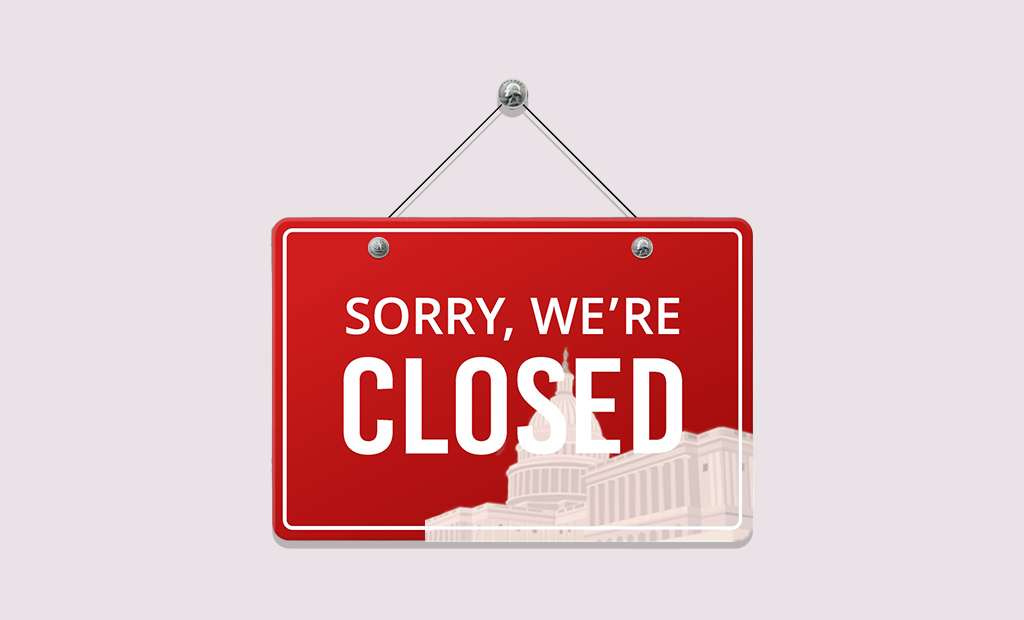How could a government shutdown affect you financially?
The status of various food, housing, and loan programs may become uncertain if the government shuts down


A free daily email with the biggest news stories of the day – and the best features from TheWeek.com
You are now subscribed
Your newsletter sign-up was successful
The U.S. government is poised to shut down on Oct. 1 if Congress doesn't come to an agreement to fund the government or at the very least, push back the Sept. 30 deadline for doing so. As Time explained, "during a shutdown, the government can only spend money on essential services, such as those related to law enforcement and public safety." This would obviously affect the federal workers who wouldn't receive their paychecks on time or would get furloughed, but other Americans would feel an impact as well.
Here's a look at some of the financial effects that Americans may experience if the government ends up shutting down.
Uncertainty for food and housing assistance
The status of various food and housing assistance programs may become uncertain if the government shuts down. Per CNN, individuals enrolled in the Supplemental Nutrition Assistance Program (SNAP) "will receive benefits through October, but what happens after that is unknown." Further, "the agency does not have sufficient funding to support normal operations of the Special Supplemental Nutrition Program for Women, Infants and Children, known as WIC, beyond a few days into a shutdown — though individual states may have additional money to continue the program," CNN reported.
The Week
Escape your echo chamber. Get the facts behind the news, plus analysis from multiple perspectives.

Sign up for The Week's Free Newsletters
From our morning news briefing to a weekly Good News Newsletter, get the best of The Week delivered directly to your inbox.
From our morning news briefing to a weekly Good News Newsletter, get the best of The Week delivered directly to your inbox.
Additionally, food banks may see disruptions to existing deliveries and their ability to place new orders, while Meals on Wheels may see its capacity cut due to delays in federal reimbursements, according to CNN.
Housing assistance is another big question mark if the government shuts down — during the last government shutdown in 2018, "the Department of Housing and Urban Development wasn’t able to renew roughly 1,650 contracts with private building owners who rent to poor Americans, many of them elderly or disabled," reported CNN.
Disruptions to student loans and education
Just as federal student loan repayments are poised to restart in October, a government shutdown may limit the Department of Education to "performing only 'skeletal program operations,'" Money reported. This would translate to customer service being "severely limited as the agency is expected to furlough the vast majority of its workforce during the shutdown," per Money.
Additionally, "the nation's schools could also face disruptions in federal funding," meaning that school districts, colleges, and universities that rely on federal funding could stop getting support, CNN reported. Younger children would also potentially face impacts, as "the White House estimates that roughly 10,000 children would lose access to childcare starting in October as disruptions to programs like Head Start, which offers grants to childcare organizations, could force some childcare centers to close," according to Time.
A free daily email with the biggest news stories of the day – and the best features from TheWeek.com
Greater difficulty getting a mortgage
Homebuyers could have an even harder time than they already are if the government shuts down. For one, "buyers applying for a government-backed mortgage from the Federal Housing Administration would face processing delays" amid a shutdown, per Investopedia. Additionally, homebuyers in need of flood insurance may have trouble getting it since "more than half of all policies are purchased through the National Flood Insurance Program, which would be unavailable during a shutdown," Investopedia noted.
More broadly, a government shutdown could cause mortgage rates to go up due to the possibility that "a shutdown could cause credit rating agencies to further downgrade the U.S. credit rating, causing investors to lose faith in the government’s willingness to repay its debts, and sparking a selloff in government bonds that would cause yields to rise," Investopedia explained.
Less informed investing decisions
Last but not least, a government shutdown could hold up the release of economic data. While that may not seem like a big deal, it could have real economic impacts, as "economists, businesspeople and policymakers — especially the Federal Reserve — rely heavily on this data to make decisions," explained Money.
Investors are also attentive to this information, as the stock market is quick to react when data gets released. As such, these data delays make "some investing decisions more difficult," warned Money, and even fuel market uncertainty. "I can't predict how markets would respond to a government shutdown, but one thing I can say is that markets do not like uncertainty. A government shutdown and the delay of this economic data that markets depend on could add fuel to that uncertainty fire," Andrew Lautz, a senior policy analyst at the nonprofit Bipartisan Policy Center, told Money.
Becca Stanek has worked as an editor and writer in the personal finance space since 2017. She previously served as a deputy editor and later a managing editor overseeing investing and savings content at LendingTree and as an editor at the financial startup SmartAsset, where she focused on retirement- and financial-adviser-related content. Before that, Becca was a staff writer at The Week, primarily contributing to Speed Reads.
